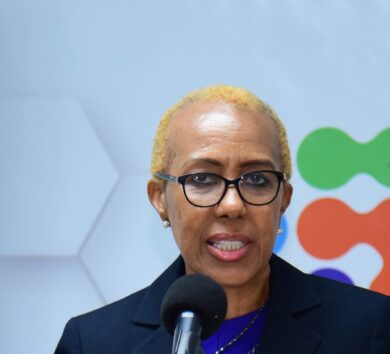

With several Early Childhood Institutions (ECIs) failing inspection standards across the island, the Early Childhood Commission (ECC) has proposed a number of recommendations to help address the concern.
The ECC today (April 27) launched its latest assessment of ECIs, in an effort to raise awareness of the operational performance of these institutions in Jamaica, the inspection process and tools utilised to assess them.
Addressing the launch of the ECC’s report was David Salmon, chairman of the commission’s Regulations and Certification Committee, who noted recommendations for stakeholders that support the process of certifying ECIs.
“It is important to… recognise that the ECI Act doesn’t just inspect the schools and leave them there.”
DAvid Salmon, chairman of the Early Childhood Commission’s Regulations and Certification Committee
Uncertified institutions are being encouraged to tap into their existing development plan to commence their path toward certification.
“It is important to… recognise that the ECI Act doesn’t just inspect the schools and leave them there. There’s a development plan that is prepared by the team at ECC, Ms Ellis Dixon and Dr Morgan, their department plays a very pivotal role in providing support,” Salmon explained.

He continued: “The ECC works with these schools in a given time frame to ensure that these schools meet the standard.”
Salmon went on to note that inter-agency collaborations could also help by curbing challenges practitioners face with obtaining required documents including health permits and police records.
“We want to limit the delays that take place because these documents are valid for one year and if there are significant delays that take place within the the year then it throws off the whole process in getting these documents in a timely manner.”
Leaders from the ECI are being encouraged to seek support from communities once they have identified the standard(s) where there is greatest need(s).

In addition to seeking community support, the ECC recommends partnering with interested private sector groups and NGOs.
“Private sector groups and NGOs that are interested in investing in the ECI can be guided by the inspection score and the ECC will also be willing to provide their needs assessment.”
Currently, the greatest proportion of needs lie in physical infrastructure which includes fencing, water tanks, furnishing bathrooms, electronic devices and playground equipment.

Finally, Salmon added that aid from the Ministry of Education and Youth (MOEY) can help to address issues of concern. The MOEY is being urged to use the latest inspection report as a guide as they channel more resources into the sector.
Salmon, during his presentation, highlighted that adept leadership as well as increased funding is needed. The latter is required to support the practitioners for the annual renewal of police records, food handlers permits and medicals as well as increase the ratio of field officers to better support institutions across the island.

Recommendations as presented in report
In light of the report’s findings, the following are the recommendations being made to all stakeholders that support the certification process of ECIs.
1- Certified Early Childhood Institutions
For ECIs that have achieved certification (100% Inspection Score), it is important that the standards of service currently being provided is maintained. A certificate of registration is valued for a five-year period. However, ECIs should take specific care to ensure that during that time, all the requirements for meeting the standard are maintained in order not to lose their certification within that five-year period.
2- Uncertified Early Childhood Institutions
ECIs that have not been certified are encouraged to use their development plan to chart their path towards certification. The ECC officers are willing and able to work closely with an ECI to ensure that these institutions are certified.
3- Areas for Strengthening ECI Operation
Partnerships with Private Sector Groups and NGOs
Partnerships with Private Sector Groups and NGOs Private sector groups and NGOs that are interested in investing in ECIs should be guided by the inspection scores of the institution and their needs assessment. Physical infrastructure and the provision of equipment have been identified as the greatest needs of ECIs. These include fencing, water tanks, furnishing bathrooms, electronic devices and playground equipment. The ECC can provide a list of needs for each inspected ECI which can be used to guide the decisions of interested groups.
4 – Community
ECI leadership can leverage support among community stakeholders to support them in achieving the standards. Institutions can seek assistance from the community after they have identified the standard(s) where there is greatest need(s).
5- Ministry of Education and Youth
As the Ministry of Education and Youth aims to channel more resources to the sector, it is essential that the inspection report should be used as the guiding tool to determine where improvements should be made for achieving the standards. The analysis of the Assessment Report of Early Childhood Institutions highlights that a number of government-operated ECIs fall below the mid-range of the standards.
Public ECIs are the flagship institutions of the MOEY. Thus, vigilance is needed to ensure that the leadership of these institutions are purposeful about achieving and maintaining the certification status of public ECIs.
It is also recommended that the MOEY increase the current funding available to early childhoodpractitioners for the annual document renewal initiative.
Additional funding is needed to support the practitioners for the annual renewal of police records, food handlers permits and medicals.
Funding should be expanded to the ECC in order to increase the ratio of field officers for greater support to ECIs. The ideal ratio to establish is one (1) field officer to 30 ECIs (1:30) and one (1) community relations officer per parish.
6 – Inter-Agency Collaboration
Based on the requirements for ECIs to obtain the requisite documents to meet the standards, there is need for greater collaboration among the municipal corporation of each parish, the Ministry of Health and Wellness, the Jamaica Constabulary Force and the Jamaica Fire Brigade.
It has been observed that ECIs experience major delays with acquiring documents from these organisations including public health certificates, food handler’s permits, police records and fire safety certificates.
The ECC recommends that these public bodies should fast track the processing of these documents for ECIs. This is in order to ensure that long delays are minimised as these documents are only valid for one (1) year.







Comments